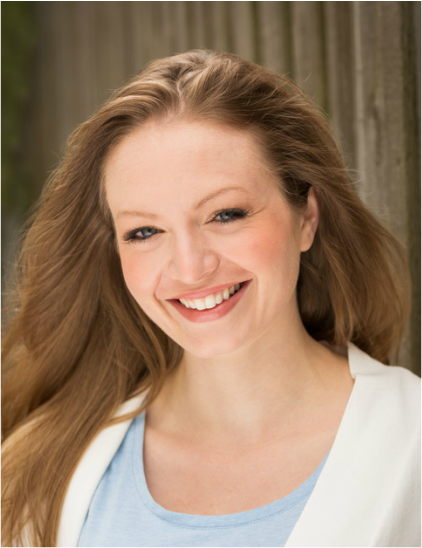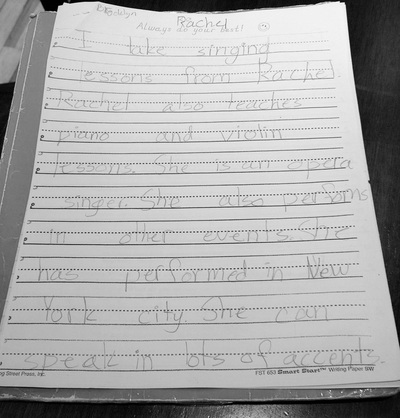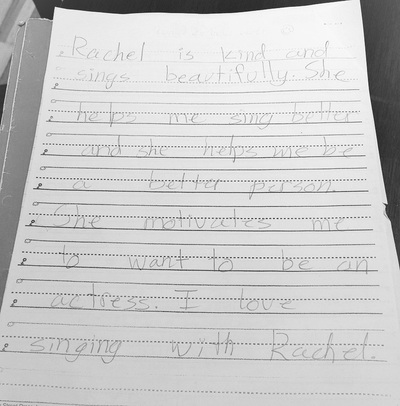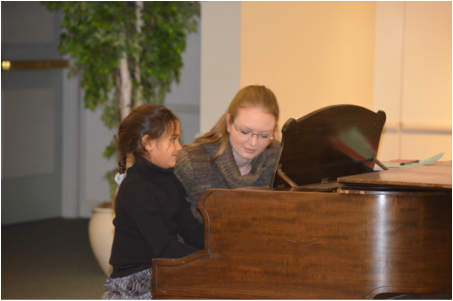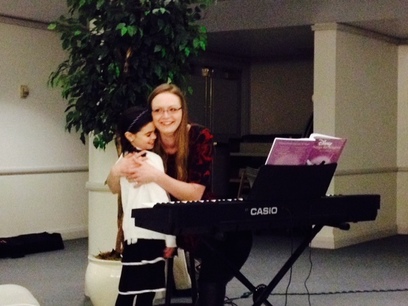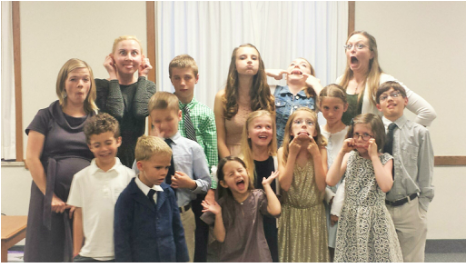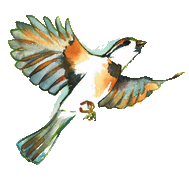Rachel Sparrow Studio
Voice, Violin, & Piano lessons in Highland Park, Illinois
|
Below is information about Rachel's private studio.
- If you are interested in Music Together Classes that Rachel teaches - they are not currently running due to Covid-19. Rachel Sparrow is a professional singing actress, teaching classical, jazz, pop, & musical theater belting techniques of singing. Rachel also teaches piano and violin. Please see below for short descriptions of her teaching philosophies & also some reviews from students. Or read more about Rachel here. Rachel Sparrow teaches children and adults, beginner to extremely advanced levels for voice lessons, beginner to intermediate piano lessons, and beginner to advanced violin lessons. The students she teaches voice, violin, and piano lessons to mostly live within the North Shore of Chicago; including Highland Park, Glencoe, Deerfield, Northbrook, Northfield, Highwood, Wilmette, Evanston, Skokie, Winnetka, and Kenilworth. Rachel is not currently able to accept new students, as her studio is full, but you can contact her to be placed on the waitlist. Things often shift around and spots may open. It seems the most prevalent times that there are shifts or openings often occurs in the summer months, and the earlier in the summer months that you get in to the studio, the better - as things fill up quickly in the fall. Don't hesitate to contact Rachel with any questions! Voice"One question I often hear when people are looking for a teacher is: "Do you only teach opera/classical singing?" The answer is absolutely not; however, I often begin a student with the classical technique because it incorporates the most efficient way to produce sound. After you have learned the proper technique behind producing the best sound, you can choose the style of singing you would like to work on in your lesson.
We sing classical, musical theater, belting (the healthy way!), jazz, & pop vocal styles! We begin each lesson with warm-up technical exercises or ear training if necessary, and then the remaining time is spent on the song literature. Dependent upon your level of singing, you may need to hire an accompanist for your lesson; however, for most students, I will accompany them during their lesson, and a separate accompanist is not necessary until recital time. There are recital opportunities twice a year for my studio. Also, it is extremely important for voice students to have a working knowledge of the piano, it is imperative for any singer. So we do spend time on piano and theory in voice lessons as well!" - Rachel Sparrow Piano"Even though in my musical life now I am a singer, the piano was my first musical instrument and I definitely feel that it is the BEST instrument to start your musical life on! I started playing at 5 years old. I took private lessons on piano until I was 17, and played competitively in high school and in state music contests. I am forever grateful to my knowledge of the piano, and it helped me learn the violin, and has definitely supported me as a singer. Music Theory is SO much easier to learn once you have a comprehensive knowledge of the keyboard.
I teach all ages, adults and children! My approach to teaching piano is different and unique from most teaching methods. I have seen the most success, and especially with children and very young students - teaching them with games. I feel that I have failed for the day if a lesson goes by without laughter from the student! We play games in order to learn songs, roll dice in order to drill difficult spots in a song... play "good" versus "evil" for wrong notes and right notes with makeshift game board (think Candyland). Sharps and flats and all notes on the keyboard are taught from the get-go, so that there is no "mystery" when we introduce them in songs later. I believe that children can handle anything you throw at them, and that it is when you begin to shelter them from the "hard" stuff, that the "hard" stuff becomes "hard". So, I have what you might call a non-hesitant approach. I don't shield a child from a difficult concept until they are 'ready...' I often just test them and push the envelope right away! I also know that not one student learns the same way another student learns. So I adapt to each student's needs as soon as I find what works the best for them. Theory is taught and scales and "music" lessons along with piano lessons. Singing and clapping rhythms is just as important as playing them correctly and each ties into the other, making the concepts stronger in the mind. We MOVE during piano lessons, we aren't just "sitting" at the piano the whole time. A good example of this would be the way I like to teach steps and skips among notes to my students. Often we "play the piano" as we jump up and down on a stair case. We have fun learning piano! And ADULTS can have fun too; we might not be jumping up and down on stair cases, but I allow you to choose the kind of music that is the most fun for you to learn on! I hold a recital twice a year for my studio." - Rachel Sparrow Violin"For this instrument, I have taught students of all ages, from 3 years old, to 72 years old. The violin is a wonderful instrument to learn at any age!
Violin was my secondary instrument in my Bachelor's Music Education Degree. I am certified to teach k-12 vocal or instrumental music. I have worked as an After-School Strings Instructor, and I was the orchestra director at the Pocatello Community Charter School in Idaho where I taught and lived for 6 years. I have played the violin for 19 years. I played competitively in high school, and then was awarded scholarships during my undergraduate career and played violin in the professional symphonies in south-eastern Idaho for the 6 years I lived there. Obviously, my main instrument is now Voice, as I sing professionally. Violin is now a very dear hobby and I still love to teach it. Playing the violin is fun! But it is a LOT of work. My students have more fun when they are willing to put in the necessary work to achieve their goals. This means you must practice. The violin is a very difficult but rewarding instrument. Private one-on-one instruction gives students the attention they need to begin playing the correct way from the start. Or, most often this instruction gives the student the attention they need to correct poor playing habits. I have found that much of my time teaching is spent correcting poor habits in order to allow the student to continue with uninhibited progress to new levels of playing. If you read my philosophy about teaching piano above, it is the same as within violin. With young children, the use of games in order to teach is the easiest and most motivating way to keep lessons fun and exciting. As I said before, I feel that I have failed for the day if my students do not LAUGH! :-) It also helps very young students (especially with violin) the most when the parent has at least a few lessons ahead of the student, so that the parent can adequately help the child at home." - Rachel Sparrow Rachel's Teaching Profile on "Thumbtack", a site that refers potential students to professionals within their communities.
Question & Answer segment from
Q. What advice do you have for a customer looking to hire a professional like you? A. Do NOT just look for the cheapest or closest lessons. You get what you pay for, most of the time. On the other hand, beware of teachers who 'over charge' and aren't qualified. Someone without a music degree is someone to be wary of, in my opinion. Stick with people who have the degrees in teaching music, they are better certified & prepared to teach. And they are more likely to LOVE it. You can tell after one lesson if a teacher is a true teacher who truly cares about their students. Q. Why does your work stand out from others who do what you do? A. I teach each student individually and cater my teaching methods to what works for THEM. Many teachers seem to teach each student the same way; use the same books, and same exercises for each student. I believe that is not only boring, but incorrect. Some students are more visual, some students need to move more, or create pieces on their own... etc. I love to experiment with students to find out the strongest way they learn and what their 'vocabulary' of learning is; and build from there- using THEIR vocabulary and tools of learning. Q. What do you like most about your job? A. I love seeing the spark in someone's eye when they learn a new concept and are able to repeat it, or "get" it. It is the biggest thrill of teaching, in my opinion. Watching the light bulb turn suddenly on in someone's brain is so fun! Q. Tell us about a recent event with students that you are particularly proud of. A. I was so proud of all of my students during their last recital. Each one of them performed their very best, and worked hard to get there. It paid off. Everyone was fabulous and their confidence grew and grew. Even if they made a mistake, they learned how to handle that in a performance situation and did so with style and finesse! |
|
